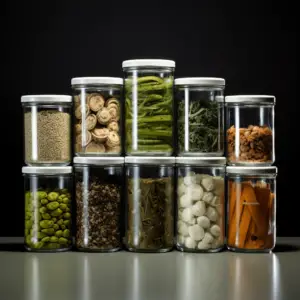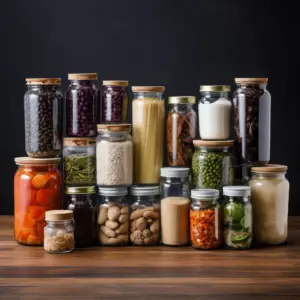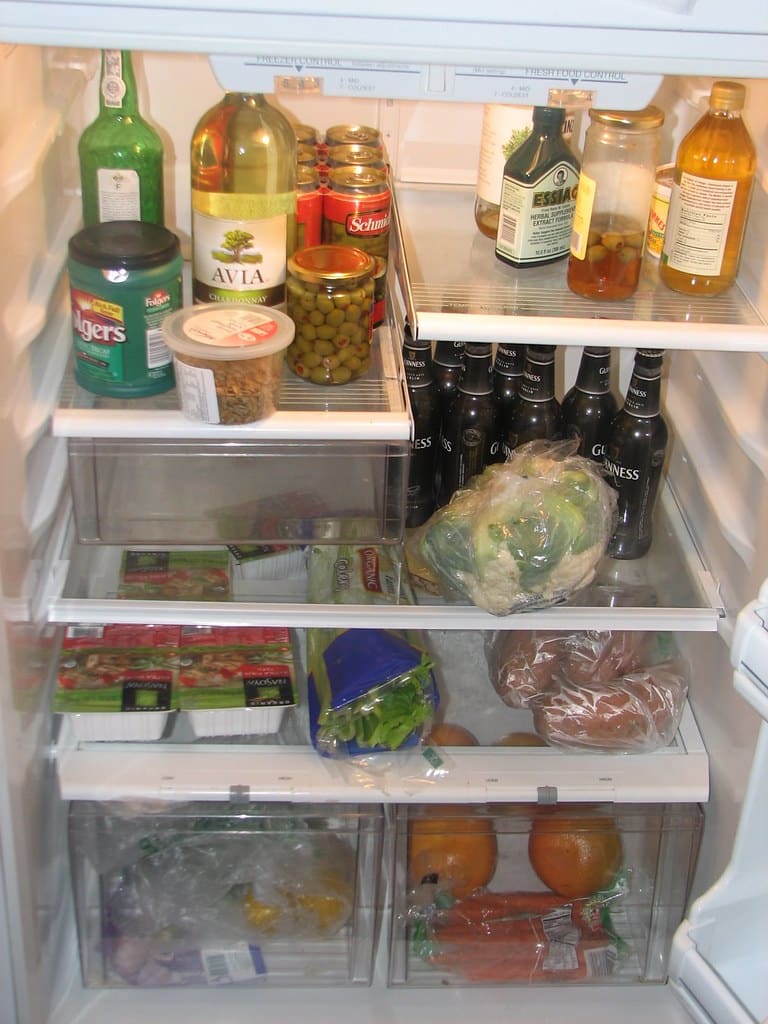Freezing Food in Glass Containers, Glass is a safe, clean, and environment-friendly material for serving and storing food for a long time. It is an excellent way to store food in the pantry, fridge, or freezer. However it is tricky to freeze food in glass, but it is possible only if you keep a few factors in mind.
So the response to the above question is yes. Glassware can be put in the freezer as long as it is kept at room temperature. In this article, we share with you the reason for using glass, how to freeze food in a drink, and hints on how you can prevent your glass from breaking in the freezer. Let’s get started.
Table of Contents
Can You Put Glass In The Freezer?

It is a fact that you can put glass in the freezer without concern. But here is more.
Glasses can break when put in the freezer because of the glass thermal shock (a term referring to sudden glass cracking due to rapid temperature change).
When you subject glass to a sudden rapid change in temperature, it can make the glass break. Therefore, it is safe to let your glassware gradually cool down or come up to room temperature before placing it in the freezer.
Don’t place cordial glasses in the freezer; let them cool to room temperature.
Ensure that the content inside the glass is not too hot, the glass container’s lead is not too tight, and there is space between the glass and the containers.
Why Freeze Food in a Glass Container?
A freezer is a place to chill your food or preserve food for a longer time, and you can keep about anything in it for even a month. However, there are specific glass containers purposely for the freezer. Nevertheless, there is a risk of breaking the glass if the content isn’t carefully handled.
Benefits of Freezing Food in Glass
- Eco-friendly
Glass is not made of petrochemicals, unlike plastic
Some drinks are recyclable, meaning they can be used many times, like glass packaging jars and bottles, but not tempered glass.
Glass is made of natural raw materials such as sand and glass waste.
Healthier for you and your family. Glass doesn’t have BPA, PVC, Phthalates, or hormone-disrupting chemicals. Freezing Food in Glass Containers doesn’t leach harmful substances into your food.
- Versatile
Glass jars and containers come in several shapes and sizes.
Some glass containers, such as glass lunch containers, can go directly from the oven to the freezer once the food has cooled or vice versa once the food thaws.
- Cheap/Affordable
The freezer-friendly glass containers and jars are cheap and versatile yet have a high quality.
You can save your glass jar from pasta sauces, pickles, condiments, etc. is one way to grow your jar collection.
- Glass Keeps In Top Condition
Glass is resistant to scratch and always looks new after several years
It is non-porous and absorbs no smell or discolors
Its is dishwasher safe and easily cleaned in soapy water
It dries fast dry due to its non-porous material
- Minimizes Food Waste
You can put leftovers in a freezer instead of the fridge
Glass use reduces waste from plastic zip-lock bags and plastic containers
The food contents are visible in glass jars and containers, so they are less likely to be unseen even in the freezer depths.
Which Is The Proper Way of Freezing Food In a Glass Container?
To avoid breakage, follow the steps below when freezing food:
- First, let the food cool
- Allow the food to cool down completely to avoid the thermal shock consequences of the glass shattering.
- Even containers designed to go directly from the oven to the freezer can last long if you allow them to cool first.
- The glass has a high chance of breaking if you’re freezing watery dishes due to expansion. Leave some space in the container and the lid.
Why does Glass Sometimes Break in the freezer?
If glass freezing is done correctly, it won’t break when put in the freezer. Nevertheless, this is a challenge many people face, and here are the possible triggers.
Glass Container Content
Liquids such as water expand as it freezes. Freezing Food in Glass Containers your container has a drink or food high in water, it can break due to the liquid pressure from the fluid inside.
Type of Glass
Not all glass is suitable for freezing. You may not experience any problem with the non-tempered glass; it is safe to use tempered glass when possible.
Tempered glass doesn’t have small pockets of air and is robust, unlike the non-tempered type, which can expand and contract with temperature changes
Thermal shock also causes the glass to shatter
6 Hacks on How to Prevent Glass Breaking When Freezing Food in Glass

Use freezer-safe Glass (Tempered)
Go for tempered glass or those labeled freezer safe which is more robust and can withstand temperature changes as you observe the main pointers of freezing glass.
Leave Headspace
The biggest reason for glass breakages in the freezer is the ability of water or liquids to expand. Therefore, leaving some space referred to as “headspace” for expansion in your glass container is advisable.
Don’t Seal the Lids Tightly
As the content in the container expands, it exerts pressure on the air inside the container. If the glass lid is tightly sealed, the stress will impact the glass, leading to a break.
Therefore, it is recommended to let your container lids loose until the content entirely freezes, depending on the type of content and the food quantity of liquid in your container. Once frozen, go ahead and tightly close the lid.
Avoid Containers with Rounded Tops
Go for containers with straight sides with a wide opening at the top of the jar and not rounded shoulders on the top to give enough room for expansion.
Change Temperatures Gradually
Allow the glasses to cool down to room temperature before placing them in the freezer.
Also, ensure you don’t put them near other freezing components when putting them in the freezer. Again, don’t place it directly on top of other frozen items, as the rapid shift in temperature might make it break.
When thawing frozen content, reverse the process by loosening the lid, putting the container in the fridge, and finally allowing Freezing Food in Glass Containers to warm up to room temperature.
Put Space between Containers
Lastly, leave space between the containers. Don’t align them right next to each other inside the freezer to offer breathing space in case any pressure changes from the containers.
What Glass Type Is Safe For Freezing Food?
Aside from the thermal shock factor, this is another you should consider when freezing glass. If a glass container is oven safe, it is also freezer safe because of thermal shock.
Glass has multiple advantages, as shown above, despite the horror stories you might have heard. As long as you carefully observe all the factors and tips shared in this article, you can safely and comfortably store your leftovers in glass containers in the freezer.
Therefore, you can place the glass into the freezer without breaking it. Nevertheless, to guarantee its safety, some conditions must be observed, such as failure to which the glass is prone to breakage.


